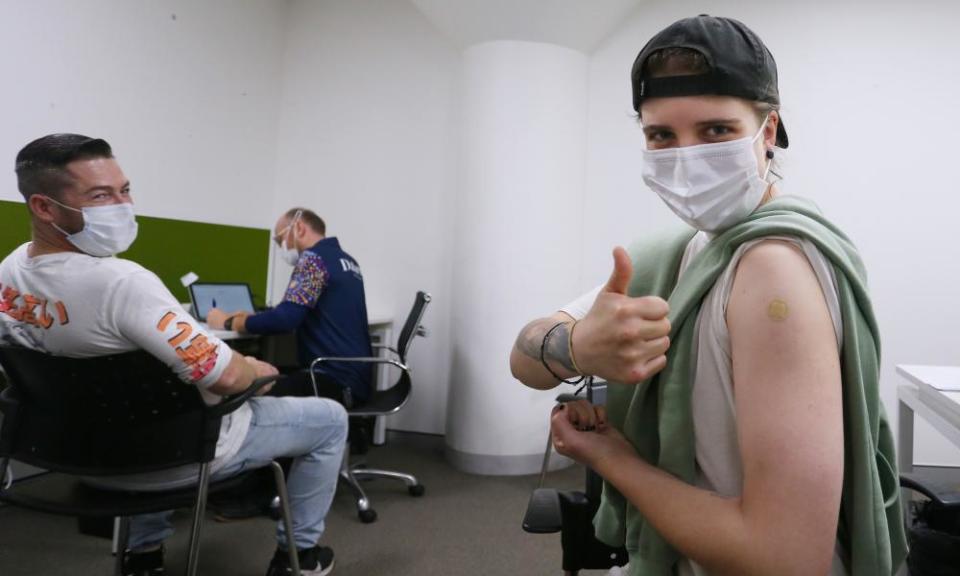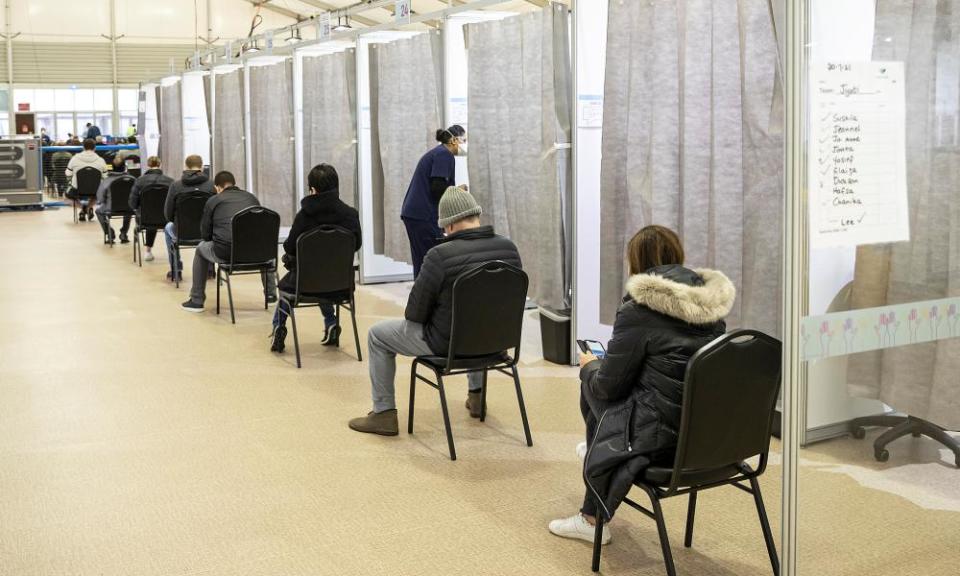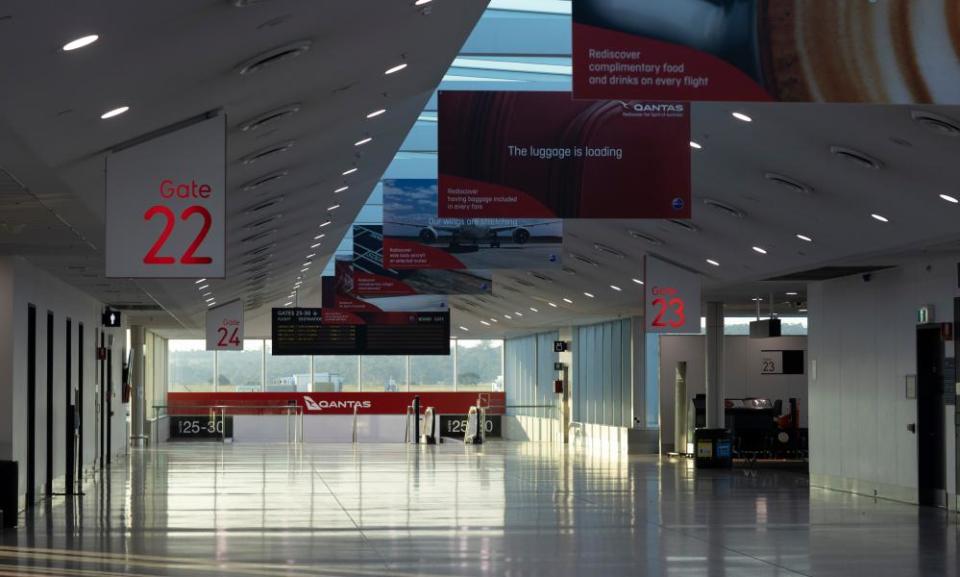‘The science swayed her’: how do you convince someone to get vaccinated?

Guardian Australia asked readers how they are talking to hesitant family and friends about vaccination, and which arguments work.
Over 200 responses revealed a range of experiences and answers. Offering the science and facts behind vaccination, and thinking of others as well as the future, were arguments readers found effective. They also offered advice on approaching the conversation, with recommendations to be an active listener and bring the conversation down to a personal level.
While hesitancy is not the sole cause for the slow vaccination rollout, it is a factor that is fuelled by confusing and changing information. The importance of having conversations about vaccination with those around you was reinforced by the words that came up time and time again; family and friends able to put it in a way someone “hadn’t thought of.”
‘The science swayed her’
“Mum was convinced by a combination of data about the likelihood of the vaccine causing clotting compared with the relative chance of serious complications from Covid. It was the science that swayed her.” Simon, Melbourne
“Data helps, such as 97% of Covid patients in ICU in the USA are unvaccinated. Death rate is one per million from AstraZeneca blood clots.” GP, Melbourne
“They changed their mind after hearing about the health workers at the West Hoxton birthday party who were the only attendees vaccinated and the only attendees who didn’t get Covid-19.” Aysha, Darwin
“My mum was hesitant about AstraZeneca as she’s had clotting issues in the past. What worked was getting her to talk to her GP. Her doctor assessed her level of risk, gave her the facts and reassured her. She had the first shot the other day and has been fine.” Casey, Sunshine Coast

“Offer information from trusted scientists and physicians (not politicians) talking about safety and showing scientific peer reviewed studies. Move away from politics!” Anonymous healthcare worker, Melbourne
“They often say the vaccine development was rushed. I point out that most of the work was already done on SARS-CoV-1 and none of it was rushed. The bureaucracy was sped up but the clinical development was exactly as rigorous as usual.” Lisa
‘We owe it to others’
“I said, I know how you feel. I was hesitant too, but the thing was I couldn’t stand the thought of being partly responsible for someone’s death.” Beth, Melbourne
“Hospitals can’t cope with too many people getting sick at the same time. If I don’t get vaccinated and then get sick I will contribute to this possible collapse. If the medical system goes down then everyone suffers. It’s a team effort.” Lindsay, Sydney
“It’s less about protecting yourself than protecting others and making it possible for young people to enjoy the same opportunities as we did to study, travel and work abroad. Also, it’s the only thing that we as individuals can really contribute to ending the crisis.” Jane, Melbourne
“I want young people and casual workers who work in hospitality and retail to not have to worry about paying rent or living due to lockdown. I want my friends who work in hospitals and in policing to be safe at work, from the virus, and from the violence about lockdown. For those of us not on the frontline, it’s the one thing we can do to create a path out of this. We owe it to others who are bearing the brunt of outbreaks and lockdowns.” Anonymous, Canberra
‘Our lives won’t get back to normal until we get vaccinated.’
“What worked best to convince my mum was that until we are all vaccinated we will have no choice but to keep going through this frustrating and disruptive cycle of lockdowns.” Rachael, Melbourne
“They say they will get it when the borders open, so I suggest that perhaps the borders will not open until we have it.” Anonymous, Perth
“In future she’d not be able to visit relatives in aged care and potentially not be able to get back to restaurants, shows or travel once vaccination passports kick in.” Anonymous, Melbourne

‘Listening is important’
“I always ask what their concerns are and relate my answer to that.” Claire, registered nurse (ICU) and immuniser, Melbourne
“I think the way you have conversations with loved ones and family members is perhaps more important than the arguments. With my dad it took three or four serious conversations and it was very important to go slowly because he was hesitant to engage with me. I very clearly said things like ‘I don’t want to judge or lecture you, I just want to understand where you’re at with it all’ or ‘tell me what you understand about the vaccines. I want to listen’. I think this is incredibly important because most people who are hesitant are not devoutly against vaccination but are scared and vulnerable and need our support and love, not our judgement.” Dale, nursing assistant, Victoria
“I usually ask them why they are hesitant and we discuss the risks and benefits. Many people have no idea what a vaccine actually is and I try to explain it in simple terms. Sometimes they don’t even understand what the concept of ‘herd immunity’ is. I feel that understanding the subject matter and explaining it in simple terms has cut through a lot of the misinformation people come across.” Brigitte Venczel, physiotherapist in aged care, Brisbane
“I find that arguments with friends and family should be tailored to their particular anxieties and hesitancy and what politics has informed their position. While with my mum, it was easier to balance the risks of the vaccine with risks of Covid, this wasn’t the same for others. My uncle, for example, fed on a diet of Sky News and News Corp that continually spits out that there is no issue, that this is just the flu. I didn’t argue but reminded him of the vaccine passports and how the sooner he gets vaccinated the sooner he will be able to travel to Singapore for work. I gave an economic reason.” Rachel, Melbourne
‘Bring it down to a personal level’
“The most persuasive thing I could do was get vaccinated myself.” Anonymous, Brisbane
“One strategy I used was to post a picture of myself getting my second shot on Facebook and saying how relieved I was to get it.” Michael, Byron Bay
“Bringing it down to a personal level makes it a bit more real and makes it hit home. Having to use a ventilator is awful, and I tell them that it feels like suffocating and drowning in your own secretions at the same. Being admitted to ICU is awful and lonely and traumatic, hooked up to machines and no visitors. All these things have higher chances of happening compared to significant side effects from vaccination.” Anonymous doctor, Sydney
“When I decided to be immunised a lot of people around me jumped on board too. I didn’t realise I had that influence. I’m the matriarch of the family so I suppose it’s to be expected. Get the family matriarchs on board, in all ethnicities.” Anonymous retired registered nurse, NSW
‘We hadn’t thought of that’
“Until Covid, none of us really cared about where the vaccines came from when inoculating our children, or for overseas travel.” Richard, GP, Noosaville
“The history of polio, smallpox and flu vaccines protecting populations is another persuasive argument.” Rob Muir, Leichhardt
“My husband was shocked when his parents said on the phone they weren’t going to get vaccinated: ‘We don’t go anywhere, we don’t see anyone. He said, ‘But what about my brother? He lives nearby and visits you often. He goes to work with dozens of other people. And what about his children? They go to school with hundreds of other kids plus the teachers, and then they visit you.’ They said, ‘Oh. We hadn’t thought of that.’” Anonymous, Engadine
“I was vaccine-hesitant initially for quite a long time. However, after my mum sent me a slew of videos with questionable sources to back their claims, I had a complete 180. I didn’t want to be on the same side as my mum and the crazies she follows. It actually pushed me to go and get vaccinated the next day.” TJ, teacher, Blacktown
Contributions have been edited for length and clarity.

 Yahoo Finance
Yahoo Finance 